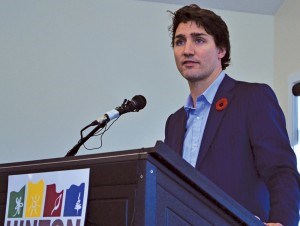
Liberal leader Justin Trudeau was in Hinton last week, criticizing budget cuts to Jasper National Park.
Trudeau spoke at the Hinton Golf Club, Nov. 6, lending his support to Liberal candidate Ryan Maguhn ahead of the Nov. 17 Yellowhead byelection. During a speech to the more than 200 people at the event, he called out the government for its significant budget cuts to Parks Canada in 2012, and specifically referred to the effects the cuts have had on Jasper.
“As one of Canada’s most popular national parks, it’s one that has seen its operating budget cut and dozens of full-time staff let go thanks to this government. That means shorter seasons and reduced access to the park for all Canadians.”
Although Jasper is open to the public year-round, Trudeau did not clarify what he meant by “reduced seasons.”
The budget cuts he was referring to took place on April 30, 2012. On that day, the government slashed Jasper’s annual budget by $2.6 million—a cut of nearly 12 per cent. As a result, 41 people—nearly an eighth of all park employees—were affected. Many lost their jobs.
In his speech, Trudeau called Jasper an “extraordinary place,” and, referring more generally to the Rocky Mountains, said that “more should be done to introduce this beautiful place to the rest of the world.”
He said he wants to see new measures to promote travel and tourism in federal budgets, and lamented the fact that Jasper receives no additional funding for being a UNESCO world heritage site.
Trudeau also voiced his opinions on Canada’s temporary foreign worker program, saying that as it stands the program has “let down” Canadians, as well as those who saw it as a path to becoming Canadian.
He said the program needs to be run with more transparency and accountability, and driven by more accurate, community-by-community data.
“We need to get serious about welcoming more permanent immigrants to Canada and providing them with a legitimate and lasting path to citizenships,” he said. “We don’t just need workers, we need community builders, entrepreneurs and permanent citizens. Let’s give those who want to make Yellowhead County their home legitimate opportunity to do so.”
He didn’t get into specifics on how he would accomplish that, but did say that the temporary foreign worker program needed to return to its original purpose: “to fill jobs on a limited basis, when no Canadian workers can be found.”
Trudeau also spoke briefly about marketing Canada’s resources abroad, saying that creating responsible and sustainable ways to get the country’s resources to global markets is “one of the government’s most important jobs.”
He stressed the importance of better environmental regulations, and said stricter ones would have ensured the American government’s approval of the Keystone XL Pipeline—TransCanada Corporation’s proposed crude oil pipeline from Alberta to Nebraska.
Later, while fielding questions from the media, Trudeau returned to the issue, bringing up the Trans Mountain Pipeline—Kinder Morgan’s pipeline carrying crude oil from Alberta to B.C.
“What Canadians want to know is that projects like this are going to be a benefit not just to the whole country or a local sector but to individuals across the country.
“That’s something you get through an open, responsible process. To get social license; to get aboriginal approval; to demonstrate environmental responsibility. That means that any given project will have an impact that is positive.
“The only responsible way to turn resource opportunities into economic realities is by sitting down and doing the hard work required to achieve consensus,” he said.
After his speech, and responding to audience questions for about 20 minutes, Trudeau greeted and took pictures with the public.
As audience members thronged to him, he signed books, shook hands and even posed holding the occasional baby.
After about half an hour, he held a brief press conference with member of the media, before moving on to his next stop of the day.
